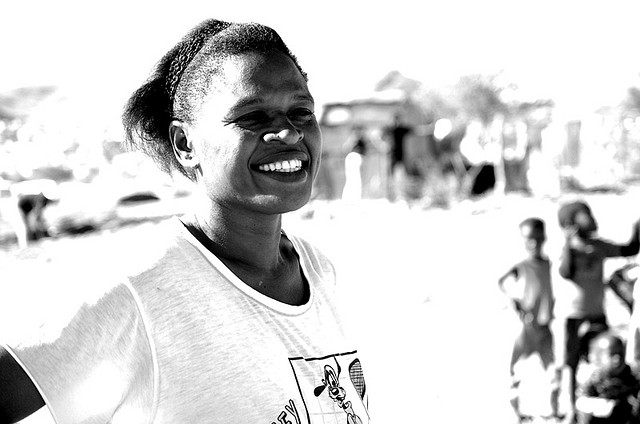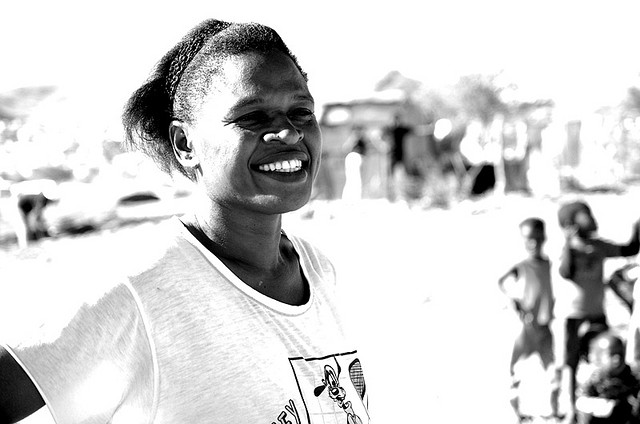
Found a forgotten piece I wrote a few years ago.
Today, I’m sitting in a fancy Vientiane cafe and studying forced evictions for school.
My mind goes back to this windy August afternoon in Windhoek.
Petrus Shaanika kicks the dirt.
A faint line of rocks marks a square plot he once called home.
“This is the place,” he says.
This is place the construction worker wanted to start over.
A few months ago, a few sheets of zinc were nailed onto wooden poles. His family of eight moved into this small 2-room shack, and for a short time, called it home sweet…well you know the saying.
“Before that, my family and I were staying at a member of my extended family’s residence in Katutura,” the 45-year-old says. “However, due to the escalating costs of paying rent and the fact that it became uncomfortable and intolerable to reside with another big family my family of eight people and I moved to Havana 6.”
No Water, No Electricity
An informal settlement on the outskirts from town, Havana Extension 6 is far removed from the hustle and bustle of Windhoek’s downtown.
There’s no water taps here yet. No electricity. Certainly there are no roads – everyone seems to travels by foot.
However, it is home to some 2,000 people who reside in shacks constructed from various body parts of retired motor vehicles, zinc sheets, plastic and particle board.
“Our place is just one bedroom and a kitchen/living room/dining room,” says Augusta Deitriks as she motions to her home half the size of my kitchen. “We just need $500 and we’ll finally have a zinc roof. Right now, we’re sleeping under this piece of collected cloth, plastic and canvas stitched together. We’ve been here for five months.”
Deitriks jokes that she’s one of the lucky ones.
Her home was never spray painted with the word ‘Remove’.
She was never visited by the City Police who tore down the shacks.
Petrus Shaanika and his family were not so lucky.
 Police Destroy Homes
Police Destroy Homes
“The members of the Windheok City Police came to Havana 6 and demolished a number of shacks, ours included. They also warned the other residents to remove their shacks or risk it being demolished too,” Petrus says.
Beginning in December 2008, Havana Ext. 6 increasingly became the target of the City of Windhoek and the City Police.
At that time, the City launched a concerted effort to remove squatters from once empty plots around Windhoek, including Havana, Otjomuise Sweend, Agste and 7 de Laan among others.
With no where else to go, those whose shacks were demolished often moved in with other families in Havana.
“My family and I now reside with another family. We are 13 people staying together,” Shaanika says. “They too are illegally on this piece of land and we all face eviction of the demolition of the shack where we now reside.”
For more than six months, the municipality routinely destroyed homesteads without, allegedly, the authority of a court order or prior notice to the occupants.
City Defends Demolition Policy
“The zero tolerance policy for land invasion must be implemented and that must be strictly enforced because it is to do with the development of the city,” says Ndangi Katoma, the manager of corporate communications and tourism for the Municipality of Windhoek.
According to Katoma, about 20 to 25 per cent of the Windhoek’s 300,000 people live in informal settlements. However, due to the way that building takes place in these communities – unstructured, too close to refuse dumping sites, in flood zones or in riverbeds, the city argues it needs to clear people from these areas.
“The problem is that we cannot really sit back and just say, ‘well, our people do not have land and therefore they can occupy any open space that they find’,” Katoma says. “It presents a major problem with regulation of this informal settlement. And most importantly it presents a challenge in terms of future provision of service in the area.”
 Reflection of Poverty
Reflection of Poverty
On a larger scale, the problem of squatter occupation of municipal land highlights severe issues facing Namibia – lack of affordable housing, unemployment, wide scale poverty and failure of government to provide essential services.
“These people are not at fault. They are simply desperate people looking for a place to stay,” says Norman Tjombe, director of the Legal Assistance Centre (LAC).
According to COHRE, forced evictions and the failure of government to realise the right to housing is one of the most widely violated human rights around the world. Over one billion people are inadequately housed.
The United Nations estimates that a further 100 million people worldwide are without a place to live. One third of all humanity, or more than two billion people, live without security of tenure, adequate legal safeguards against forced eviction and without access to clean and affordable drinking water in the home.
“Imagine children who are evicted from their homes and have to sleep under a bridge. Their right to education is likely affected, their dignity is affected,” Tjombe remarks. “For families, their right to privacy and to security of person is violated. Their right to the peaceful enjoyment of possessions is violated as many of the forced evictions occurred without warning, forcing people to abandon their homes, lands and worldly possessions.”
Overturning an Apartheid Era Law
Using the Squatters Proclamation of 1985 as their legal instrument, an apartheid-era law that allows the owner of land to remove illegally constructed building or structures without authority of a court order or prior notice to the occupants, the municipality’s employees destroyed an estimated 2,000 shacks. The forced evictions sparked protests, outrage and fear among the thousands left homeless.
In July 2009, a group of 14 squatters including Petrus Shaanika, representing various community organisations, approached the LAC to challenge the legality of the municipality’s right to evict tenants living in Havana Ext. 6 without a court order.
“It is now winter and some of the residents whose houses were demolished are sleeping outside and exposed to the harsh elements of nature and threats of crime being visited upon their person and property,” says Shaanika, who is the chairperson of Mercy Group 6 – a community group set up to voice concerns for the people in Havana Ext. 6.
In an urgent application, the LAC’s lawyers asked the court to declare the Squatters Proclamation of 1985 unconstitutional as it did not take into consideration the circumstances of families with small children or the lack of available alternative housing.
In his ruling, High Court Judge Petrus Damaseb granted the shack dwellers and interim interdict, declaring the Squatters Declaration of 1985 invalid and of no effect. The case returns to court in the near future when the City of Windhoek and the Government will be given an opportunity to argue why the law should not be declared unconstitutional.
Life Continues in Havana
Meanwhile, in Havana Ext. 6 Shaanika and Augusta Dietrik survey the land in dispute.
The rolling hills, dotted with shacks are home to children playing in the dirt and grass, to grandmothers cooking on open fires, to young women carrying water to their places and to young men cutting wood in front of their homes.
This isn’t life they imagined. But it is a life.
Dietrik and Shaanika quickly point out that they’re not object to paying for the land they are residing on. In fact, Shaanika has been on a municipal waiting list for land since 2002. However, the escalating prices of property in Windhoek have made purchasing land financially impossible for people living on low incomes.
Instead, with neighbours, Shaanika and Dietrik have formed small self-help groups to pay for property should it come available.
Already, they are collecting monthly to put together a down payment. In a few months, they should be ready.
In the meantime, they are calling on Namibian government, the City of Windhoek, to provide affordable land where they, who are earning meager wages, can survive.
“The municipality doesn’t know how we are suffering,” Dietrik says. “This is a hard life.”
